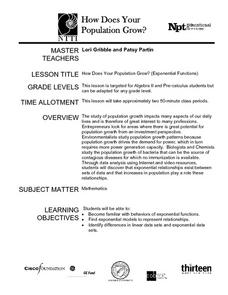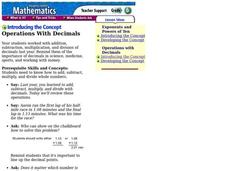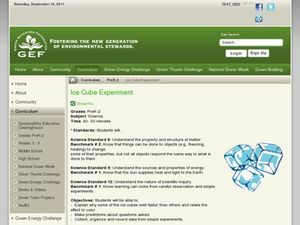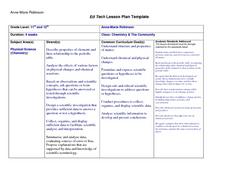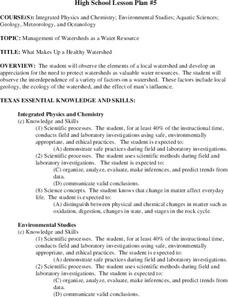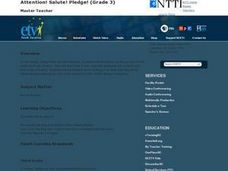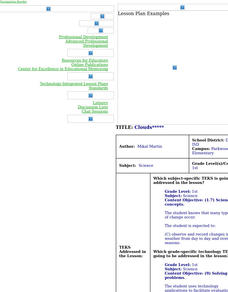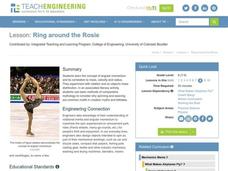Curated OER
Sextant Solutions
Middle schoolers explore ways a sextant can be a reliable tool that is still being used by today's navigators and how computers can help assure accuracy when measuring angles. This activity will show how computers can be used to...
Curated OER
Crash Test Dummies
Fifth graders are introduced to Newton's First Law of Motion. In groups, they describe the differences between balanced and unbalanced forces. They participate in experiments that demonstrate how equal and opposite forces act upon...
Curated OER
Class of Gold
How can you see a number in nature? Here, learners discover both Fibonacci numbers and the golden ratio by exploring a number of different resources. Note: Some of the resources are older and may be missing some of the links, but...
Curated OER
How Does Your Population Grown?
Do you know how the population has grown of your community? Can you predict the population over the next half century? Can we find an algebraic model that matches our data? These along with many more questions can be researched by...
Curated OER
African Country Report
Sixth graders describe the relationship between the people of Africa and their environment. They examine the climate, economy and inhabitants of this land. Using maps graphic organizers and writing a report, 6th graders demonstrate how...
Curated OER
Operations with Decimals
Teach your learners to solve word problems. They will review how to add, subtract, multiply, and divide with decimals. Then they solve multiple problems.
Curated OER
Ice Cube Experiment
Students explore the rate at which ice melts. In this science lesson plan, students place ice cubes on colored index cards and place them in direct sunlight. Students observe which ice cubes melt fastest and slowest.
Curated OER
Chemistry & The Community
Young scholars complete a Webquest which investigates the chemistry in items such as shampoo. They research the Internet, perform a lab experiment, and write a scientific lab report with their findings. Upon completion of the activities,...
Curated OER
Oxidation and Salt
Students study the reaction on iron in water, air, and sodium chloride. They create a situation that shows this process and gives them the opportunity to hypothesize what, why, and how. They keep records and do an oral and written ...
Curated OER
Evaporation Introductory Lesson
Fourth graders examine the concepts of evaporation and the water cycle. They describe the relationship between heat energy, evaporation and condensation of water on Earth and identify the sun as the source of energy that evaporates...
Curated OER
Water Cycle
Third graders define and discuss evaporation, precipitation, condensation, and collection, color web pages to illustrate Water Cycle book, listen to stories about Water Cycle, play trivia game to demonstrate knowledge of what they...
Curated OER
What Makes Up a Healthy Watershed
Students, after observing the elements of a local watershed, explore the need to protect watersheds as water resources for the future. They examine the factors involved with a watershed: geology, ecology, and the effect of man's...
Curated OER
Ziplock Chemistry
Students investigate various chemical reactions when creating mixtures in ziplock baggies. In this chemistry lesson, students will recognize various chemical reactions and cite evidence. Safety and assessment strategies are included in...
Curated OER
Hardy-Weinberg Equilibrium
Students investigate how Hardy-Weinberg Equilibrium is established and what assumptions and conditions are necessary to reach Equilibrium. They model alleles using materials such as index cards, M & M's and goldfish.
Curated OER
Decolonization and Self-Determination
Students define and discuss colonialism and self-determination. After reading the European's view on the topic, they analyze a map of imperialism in 1914. They watch excerpts of a video and take notes on various United Nations...
Curated OER
Attention! Salute! Pledge!
Third graders recognize the American flag as a symbol. In this symbols lesson, 3rd graders review the video "U.S. Flag: Proper Use" and identify what the stars and stripes represent. Students view an online clip of how to fold the...
Curated OER
Beads, Balls, and Beakers
Learners analyze the amount of space required to pack round objects. For this geometry lesson, students practice using space economically by practicing packing spheres into beakers. They then translate this concept to molecules being...
Curated OER
Free Land
Students investigate the impact of the passage of the Homestead Act. In this Westward Expansion lesson, students visit selected websites to examine the lives of Americans who settled the American frontier.
Curated OER
Applied Science -Physics (2B) Pre Lab
Second graders look at different types of energy. In this energy lesson, 2nd graders define energy and the difference between kinetic and potential energy. They see examples with falling books and a slinky.
Curated OER
Clouds
First graders create a PowerPoint presentation and identify three types of clouds; cirrus, stratus and cumulus. In addition, 1st graders construct their own type of cloud during a hands-on activity.
Curated OER
Ring Around the Rosie
Students examine the concept of angular momentum and its correlation to mass, velocity, and radius. They listen to a teacher-led lecture, conduct an experiment with rotational inertia, angular momentum, and rotation speed by making...
Curated OER
Island of the Blue Dolphins Jigsaw
Fourth graders research three topics from the book, either Village Life, Sea Life, or San Nicholas Island. They research independently and meet in a jigsaw format to share what they learned. As group they create a poster for class...
Curated OER
To War Or Not To War?
Seventh graders research the political, societal, and economic factors of World War I, World War II, and the 2001 war against terrorism. They participate in class discussions, write journal entries, and conduct Internet research. ...
Curated OER
Einstein's Big Idea
High schoolers investigate the concept of the Einstein's Theory of Relativity while conducting research using the internet and following the outline of the objectives to guide the information search. The lesson includes background...



